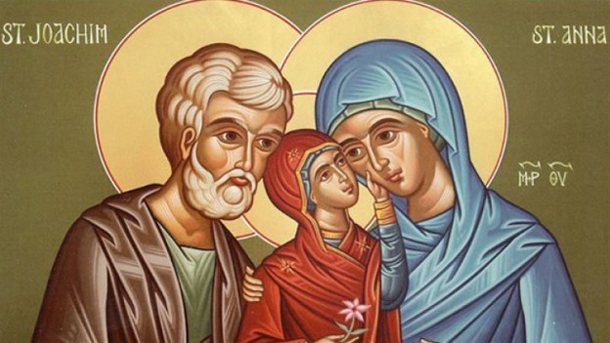 According to the script, Anne and her husband Joachim had no children for a long time. In most ancient cultures this was considered as a bad sign. Their desire and their prayers to God were so sincere that he finally fulfilled their request. One day while Anne was working in the garden, an angel came upon her and told her and her husband that they would have a baby girl. St Anne is considered the protector of pregnant women, children, marriage and family and the feast is mainly celebrated by the women. In Veliko Tarnovo region mothers do not work on this day, so their children stay healthy. In Strandzha region the feast is marked on December 22 and is known there as Sveta Anna or Tuyana.
According to the script, Anne and her husband Joachim had no children for a long time. In most ancient cultures this was considered as a bad sign. Their desire and their prayers to God were so sincere that he finally fulfilled their request. One day while Anne was working in the garden, an angel came upon her and told her and her husband that they would have a baby girl. St Anne is considered the protector of pregnant women, children, marriage and family and the feast is mainly celebrated by the women. In Veliko Tarnovo region mothers do not work on this day, so their children stay healthy. In Strandzha region the feast is marked on December 22 and is known there as Sveta Anna or Tuyana.
In Southwest Bulgaria there is a saying that on this day the sun leaps as high as a chicken over a threshold. This is the time of transition from autumn to winter, but the sun also starts gradually moving towards summer. Lasses predict whether they will marry next year by sowing wheat grains into a new pot filled with water. They also dip apple or sour-cherry twigs into that pot. If the wheat grains germinate by Vasilovden (St Basil Day-January 1) and the twigs put forth leaves this will augur well for the lass and she would marry soon. In Graovo region (Pernik district) the feast is also known as Polazevden. According to people’s beliefs, one can start a new job on this day. In some places people predict how good the following year will be, or the sex of their baby by the first guest who visits the house. Women do not weave and work with wool. Thus, more female lambs will be born in the house and the flocks would be protected from wolf attacks. According to pagan beliefs, men should not go outside the village on this day. Otherwise, they may be charmed by wood-nymphs. In some areas people burn piles of manure, in order to chase evil spirits away. Women hand out boiled wheat and sweetcorn for good health. No meat dishes are allowed on this day, as it is part of the Nativity Fast.
English version: Kostadin Atanasov
The historic town of Tryavna will celebrate St Lazarus' Day, traditionally held on the Saturday before Palm Sunday. The Bulgarian custom, known as lazaruvane , is closely linked to the themes of love and marriage and will be re-enacted this..
The feast of the Annunciation (Blagoveshtenie in Bulgaria) is a holy day , a symbol of God’s infinite mercy to people and especially to women, blessed to bear new life, but also an embodiment of the eternal human longing for something better in the..
Clocks and bells will ring out in the center of Stara Zagora on Saturday, when the city will host the XXIV Masquerade Games Festival . The event will start with a traditional parade of participants. Attractive babugers, araps, old men and other..

+359 2 9336 661
